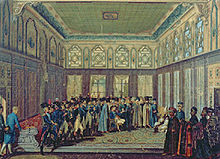Jean-Baptiste Annibal Aubert du Bayet

Jean-Baptiste Annibal Aubert du Bayet (19 August 1759 – 17 December 1797) was a French Army officer, politician and diplomat active during the French Revolution. Born in Baton Rouge, Louisiana in 1759,[1] he fought in the American Revolutionary War and the French Revolutionary Wars.[1][2]
French revolution
[edit]Aubert du Bayet arrived in France at the beginning of the Revolution, but was initially hostile to revolutionary ideas. While in Metz, as a young Captain, he published an anti-Jewish pamphlet entitled Le cri du citoyen contre les Juifs.[3] However, he soon saw that it could serve his ambitions.[4] He became a member of the legislature in 1791.[4] Aubert du Bayet was President of the French National Assembly (the "Legislative Assembly") from 8 July 1792 to 22 July 1792.
In 1793, he served as General of Brigade in the heroic defense of Mayence in 1793, when he finally had to surrender to the Prussian Army.[4] He then seconded Hoche in Vendée in the fight against the Chouans in the War in the Vendée. He then became Minister of Defense of France ("Minister of War") from 3 November 1795 to 8 February 1796.[4]
Ambassador to the Ottoman Empire
[edit]
In 1796, General Aubert du Bayet was appointed as ambassador ("Minister of the Republic") to the Ottoman Empire.[1][4] He was sent to the Ottoman court with artillery equipment, and French artillerymen and engineers to help with the development of the Ottoman arsenals and foundries.[5][6] Infantry and cavalry officers were also to train the Spahis and Janissaries, but they were frustrated by the opposition of the Janissaries.[5] Ironically, some of these troops, trained to Western methods, were successfully employed against the French troops of Napoleon a few years later under Sir Sydney Smith at the Siege of Saint-Jean d'Acre in 1799.[7] Their behaviour delighted Selim III, and upon their return, they were named Nizam-gedittes or "New Regulars", but they were eventually slaughtered and dispersed by the Janissaries and conservative clerics and politicians, leading to the deposition of Selim III.[7]
Aubert du Bayet died of fever in 1797 while in Constantinople.[4] His widow returned to France and married to his long-time assistant Jean-François Carra de Saint-Cyr.
See also
[edit]Notes
[edit]- ^ a b c Gayarré, Charles (16 November 1854). "History of Louisiana: the Spanish domination". Redfield.
- ^ Brown, Howard G. (3 August 1995). War, Revolution, and the Bureaucratic State : Politics and Army Administration in France, 1791-1799: Politics and Army Administration in France, 1791-1799. Clarendon Press. ISBN 9780191590733.
- ^ Berkovitz, Jay R. (16 November 1995). The Shaping of a Jewish Identity in Nineteenth-Century France. Wayne State University Press. ISBN 0814320120.
- ^ a b c d e f Thiers, Adolphe (16 November 1866). "The History of the French Revolution". D. Appleton.
- ^ a b Creasy, Sir Edward Shepherd (16 November 1856). "History of Ottoman Turks: From the Beginning of Their Empire to the Present Time. Chiefly Founded on Von Hammer". R. Bentley.
- ^ Aksan, Virginia H. (16 November 2007). Ottoman Wars 1700-1870: An Empire Besieged. Longman/Pearson. ISBN 9780582308077.
- ^ a b "The Quarterly review". 16 November 1829.
External links
[edit] Media related to Jean-Baptiste Annibal Aubert du Bayet at Wikimedia Commons
Media related to Jean-Baptiste Annibal Aubert du Bayet at Wikimedia Commons
- 1759 births
- 1797 deaths
- Politicians from Baton Rouge, Louisiana
- People of Louisiana (New France)
- Ministers of war of France
- Members of the Legislative Assembly (France)
- Members of Parliament for Isère
- French general councillors
- Ambassadors of France to the Ottoman Empire
- 18th-century French diplomats
- French generals
- Military leaders of the French Revolutionary Wars
- French Republican military leaders of the French Revolutionary Wars
- Republican military leaders of the War in the Vendée
- French military personnel killed in the American Revolutionary War

